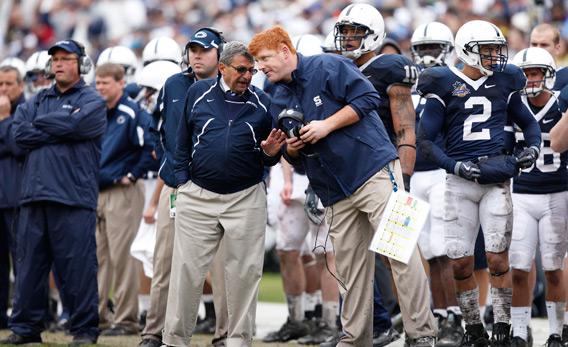On March 1, 2002, Mike McQueary allegedly walked into the Penn State locker room and saw Jerry Sandusky raping a young boy. According to the grand jury report in the Sandusky case, McQueary—then a 28-year-old graduate assistant for the Nittany Lions football team—“left immediately, distraught.” McQueary then called his father, who advised him to tell coach Joe Paterno what he’d seen. He did as his father advised, and a short while later, he told Penn State’s athletic director Tim Curley and administrator Gary Schultz as well. A few weeks later, the report explains, Curley told McQueary “that Sandusky’s keys to the locker room were taken away and that the incident had been reported to The Second Mile,” Sandusky’s nonprofit for at-risk children. Until he testified before the grand jury, that’s where the story ended for Mike McQueary. He was never interviewed by Penn State police, and he never reported Sandusky’s actions to any other agency.
In the week since we’ve learned of Sandusky’s horrible crimes and Penn State’s negligence in reporting them, almost everyone who could conceivably have done anything to stop the alleged child molester has resigned or been dismissed. Paterno is out. So are Curley and Schultz and Penn State President Graham Spanier. But Mike McQueary, now Penn State’s receivers coach, still has a job, and as of Thursday afternoon, he’s supposed to coach in Saturday’s football game against Nebraska. [Update, 11/10/2011, 10:45 p.m.: Penn State has announced that McQueary will not be at Saturday’s game, explaining that the school has received “multiple threats” against the coach.] [Update, 11/11/2011, 7:10 p.m.: McQueary has now reportedly been placed on administrative leave. He also reportedly told his players that he is no longer their coach and that he is in “protective custody.”] How you feel about McQueary’s job status depends on how you choose to parcel out blame. Do you find the most fault with a man who witnessed a disgusting criminal act and didn’t report it to the police? Or do you believe it’s fair to punish those at the top of Penn State’s chain of command most harshly?
Mike McQueary made the wrong choice. He—like so many others at Penn State and elsewhere—could have helped put an end to Sandusky’s abuse many years ago. Why didn’t he? He was the low man on the football staff, a grad assistant making little money whose best hope of advancement was to ingratiate himself to his superiors. McQueary was also a former Penn State starting quarterback who grew up in State College, Pa. He played for, worked for, and no doubt idolized Joe Paterno and perhaps Jerry Sandusky, too. When he allegedly saw Sandusky raping a boy in the shower, McQueary shouldn’t have just called the police—he should have rescued the boy. But I can understand why someone in his position, with his background, would have run out of the room immediately and called his father.
In the grand jury report, there’s one more instance in which a low-level employee didn’t act as bravely as he could have. In 2000, a temp janitor named Jim Calhoun allegedly saw Sandusky—a man he didn’t recognize—performing oral sex on a boy in the Penn State showers. According to one of Calhoun’s colleagues, the janitor, who was “upset and crying,” said that he had “fought in the [Korean] war … seen people with their guts blowed out, arms dismembered … I just witnessed something in there I’ll never forget.” Calhoun told his immediate supervisor what he’d seen, and the supervisor “told him to whom he should report the incident, if he chose to report it.” Calhoun never made an official report, and he wasn’t able to testify in front of the grand jury because he now suffers from dementia.
As Luke O’Brien pointed out on Deadspin, what happened at Penn State is a modern version of the Kitty Genovese case, the 1964 rape and murder in which the victim’s neighbors didn’t call the police. The Penn State case, though, seems even worse: While it’s unclear how much Genovese’s neighbors saw and heard, at least two people allegedly saw Sandusky sexually assault a young boy and many more heard about it secondhand. As a consequence, this seems like a better example of “Genovese syndrome” than the attack that inspired that coinage. Nobody at Penn State, from the janitor to the university president, stood up and did the right thing. Those at the top of the school’s org chart were protecting the institution, the program, and their own high-status positions. Those at the bottom were protecting their livelihoods, likely hoping that someone else would be courageous enough to do what they could not.
In the end, it’s possible to comprehend Mike McQueary’s actions but impossible to rationalize them. Though turning in your superiors is a very difficult thing to do—there’s a federal Whistleblower Protection Act for good reason—in this case it was the only thing to do. McQueary has yet to talk publicly; his father told the New York Times that “it’s eating [McQueary] up not to be able to tell his side, but he’s under investigation by the grand jury.” No matter what he eventually says, this fact remains: For almost 10 years after McQueary allegedly saw Sandusky raping a child in the shower, the former Penn State defensive coordinator had access to the school’s football facilities. McQueary, like Paterno and Penn State’s administrators, didn’t have just one chance to turn Sandusky in. He could have gone to the police at any time. And yet, he watched as the old coach used the team’s weight room as recently as last week.
So, does McQueary deserve as much blame as Penn State President Graham Spanier? Probably not. Does he deserve a significant share of it, having stood by when a predator could have been put away? Absolutely.
